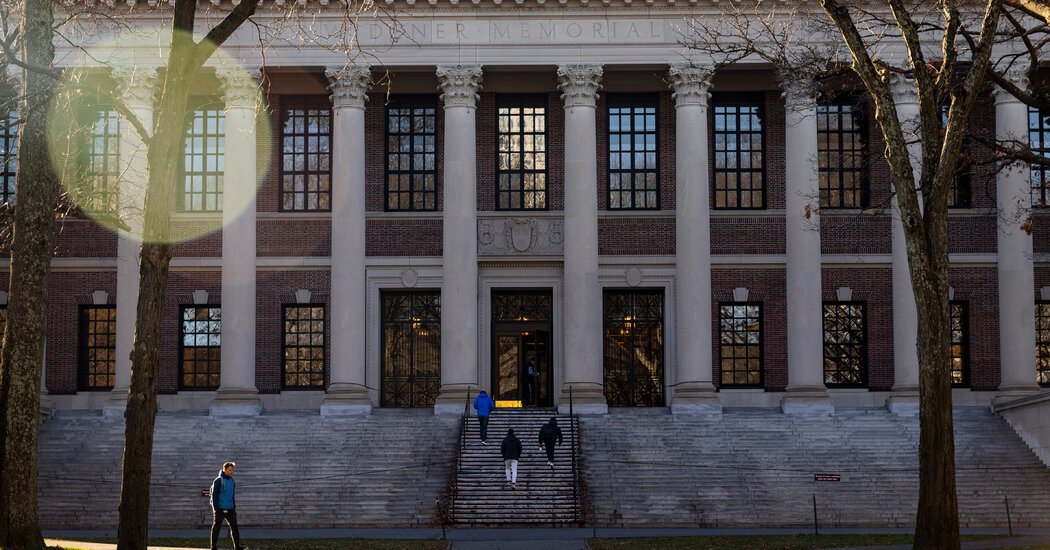Harvard’s Faculty of Arts and Sciences, the university’s largest division, said on Monday that it would no longer require job applicants to submit diversity statements, the latest shift at the university after months of turmoil over its values and the role of equity initiatives in higher education.
Instead, the division will require only finalists for teaching jobs to describe their “efforts to strengthen academic communities” and discuss how they would promote a “learning environment in which students are encouraged to ask questions and share their ideas,” Nina Zipser, the dean for faculty affairs and planning, said in an email to colleagues.
The decision represents a sharp break from Harvard’s recent practices and comes less than six months after Claudine Gay, Harvard’s first Black president and a former dean of the Faculty of Arts and Sciences, resigned amid accusations of plagiarism and complaints that Harvard was doing too little to combat antisemitism. The chaos surrounding Dr. Gay intensified debates about the sway of diversity initiatives in academia.
Dr. Zipser made no mention of Dr. Gay in her announcement on Monday morning. Rather, Dr. Zipser attributed the change to feedback from “numerous faculty members” who feared that diversity statements were “too narrow in the information they attempted to gather and relied on terms that, for many, especially international candidates, were difficult to interpret.”
In a statement that echoed Dr. Zipser’s email, Harvard said the “updated approach” would acknowledge “the many ways faculty contribute to strengthening their academic communities, including efforts to increase diversity, inclusion, and belonging.” The university added that the decision amounted to “realigning the hiring process with longstanding criteria for tenured and tenure-track faculty positions.”
Last month, the Massachusetts Institute of Technology said it would no longer require diversity statements, which some academic departments had chosen to seek. M.I.T.’s president, Sally Kornbluth, said at the time that the university could “build an inclusive environment in many ways, but compelled statements impinge on freedom of expression, and they don’t work.”
Critics of diversity statements, which often require candidates to explain how they would increase or contribute to campus diversity, have long complained that such compulsory writings threaten to suppress robust debate.
On Monday evening, Lawrence H. Summers, a former Harvard president, applauded his university’s decision. “This should represent a major pivot towards emphasis on academic values and away from identity in appointment decisions,” Dr. Summers wrote on social media. The decision, he said, showed that Harvard was “finding its way back towards the right core values.”
Yet backers of the diversity statements at Harvard and elsewhere have framed them as contemporary methods to promote a range of views, especially after the U.S. Supreme Court decision last year that ended race-conscious admissions.
“Furor over diversity statements in hiring is a red herring,” Edward J. Hall, a philosophy professor, wrote in The Harvard Crimson in April. He urged a redirection of anger toward “its proper target: not diversity statements themselves, but rather the horribly distorted view that has taken hold about what they should contain.”
A handful of states have banned their public universities from requiring diversity statements, or prohibited them altogether, including North Dakota, Florida and Texas.
Monday’s announcement from Harvard reinforced the depth of the turmoil that has shadowed the Ivy League university since the Oct. 7 Hamas attack on Israel.
Last week, Harvard said that it would curb its statements about topics not “relevant to the core function of the university.” But it stopped short of fully embracing the notion of institutional neutrality, a principle promoted by the University of Chicago in which universities commit to staying out of political and social matters.
And Harvard’s decision to bar some protesters from graduating last month led hundreds of students to walk out of its commencement ceremony.


